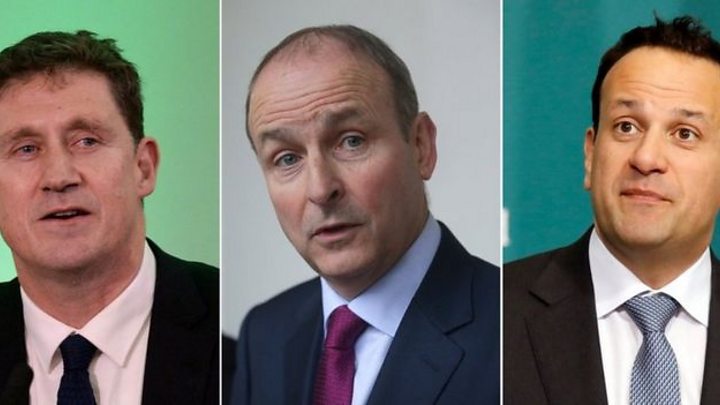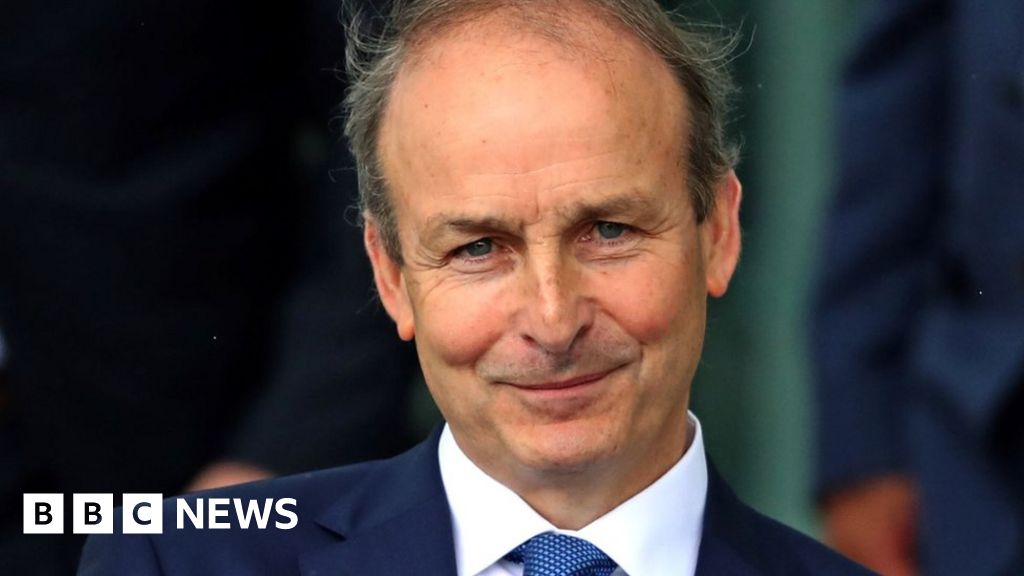Image copyright
PA Media
Micheál Martin will lead his Fianna Fáil party into a historic coalition with Fine Gael and the Greens
Micheál Martin has been elected as the new taoiseach (Irish prime minister) at a special meeting of the Irish parliament in Dublin.
The 59-year-old Cork native has been the leader of the Fianna Fáil party since 2011.
He will lead a three-party coalition consisting of Fianna Fáil, Fine Gael and the Green Party.
It is the first time in history that former Civil War rivals Fianna Fáil and Fine Gael have governed together.
Mr Martin is expected to lead the country until December 2022 before handing back over to Leo Varadkar, the Fine Gael leader.
In his acceptance speech, Mr Martin said that to be elected to serve as taoiseach was “one of the greatest honours which anyone can receive”.
“I am humbled by the responsibility and I pledge to work night and day with my partners in government to realise the great potential of our nation,” he said in his first tweet as taoiseach.
Image copyright
EPA
Micheál Martin pictured leaving Dublin’s Convention Centre after being elected
Mr Martin has been a member of the Dáil (lower house of Irish parliament) for just over 30 years.
He served as cabinet minister in several Fianna Fáil governments from 1997 to 2011 and his roles included minister for foreign affairs; health; education as well as enterprise, trade and employment.
As health minister in 2004, he became the first national government minister in any part of the world to introduce a workplace smoking ban, which also banned the public from lighting up in pubs.
Mr Martin was elected taoiseach by members of the Dáil in a special sitting on Saturday.
The vote took place at the Convention Centre in Dublin, rather than its traditional home at Leinster House, due to Covid-19 social distancing rules.
A majority of 93 members of the Dáil voted in favour of him taking the role, while 63 members voted against him.
Mr Martin was later presented with his seal of office by Irish President Michael D Higgins at the president’s official residence, Áras an Uachtaráin, on Saturday afternoon.
Later, he is due to unveil his cabinet before the Dáil votes on their nominations.
Mr Varadkar has been caretaker taoiseach since the general election in February.
No party came close to winning a majority in the poll which would enable them to govern alone, but coalition talks were then halted by the coronavirus pandemic.
Fianna Fáil and Fine Gael have their origins in the Irish Civil War almost 100 years ago and have never been in coalition together.
Fianna Fáil won the most seats, but the two larger parties needed the support of the Greens to have a working majority in the Irish parliament (the Dáil).

Media playback is unsupported on your device
The party leaders and their negotiating teams reached agreement on a coalition deal earlier this month.
On Friday, UK Prime Minister Boris Johnson tweeted: “Congratulations to Ireland on forming a new Government and to Micheal Martin TD on becoming Taoiseach.
“Ireland is our closest neighbour, good friend and ally on issues such as climate change, the global fight against Covid-19 and our shared values on human rights and democracy.”
Scotland’s First Minister Nicola Sturgeon also tweeted her congratulations, saying she looked forward to engaging with Mr Martin soon to “further strengthen the relationship between Scotland and Ireland”.
Analysis: BBC News NI Dublin Correspondent, Shane Harrison
Micheál Martin was the only Fianna Fáil leader in the party’s history not to have served as taoiseach, but that changed today.
Image copyright
PA Media
Micheál Martin is expected to be taoiseach (prime minister) for two and a half years
He will hold the role for 30 months before handing over to Fine Gael leader Leo Varadkar.
The two parties, both centrist, Fianna Fáil slightly to the left and Fine Gael to the right, have dominated the politics of the state since its foundation.
Although there has been little to separate them policy-wise for decades, their decision to share power in government for the first time is historic.
But it’s also a political necessity for their leaders to keep Sinn Féin, the party that got the most votes in February’s general election, away from government.
Sinn Féin has accused the two of using the Greens as a “fig leaf” to disguise their denial of the electorate’s demand for change.
The three parties have five years to disprove those who claim the new coalition is simply a slightly greener version of business as usual in such areas as housing and dealing with climate change in a radical manner.
A meeting between Mr Martin and Northern Ireland’s first and deputy first ministers, Arlene Foster and Michelle O’Neill, is likely in the coming days.
While there will be new faces, there will be some old problems to talk about such as Brexit and Covid-19.
Not everyone supported the new taoiseach during Saturday’s vote in the Convention Centre.
‘Marriage of convenience’
Sinn Féin leader Mary Lou McDonald accused Fianna Fáil and Fine Gael of conspiring to exclude them from government.
At February’s election, Sinn Féin took 24.5% of first-preference votes, compared to 22% for Fianna Fáil and 21% for Fine Gael.
“Faced with the prospect of losing their grip on power, Fianna Fáil and Fine Gael have circled the wagons,” she said, claiming the new coalition was a “marriage of convenience”.
Image copyright
Oireachtas TV
Mary Lou McDonald claimed Sinn Féin had been excluded from power
But Fianna Fáil’s Norma Foley nominated her party leader, saying Micheál Martin had a proud record for delivering for the people of Ireland.
She praised his previous record in government and said he “has the talent and tenacity we need to lead the country with distinction”.
‘Civil War politics’
Fine Gael leader and outgoing taoiseach Leo Varadkar said his party would not make a nomination but instead would support the nomination of Micheál Martin.
Referring to their two parties entering a coalition for the first time, Mr Varadkar said Saturday’s vote was an “historic occasion”.
“I believe Civil War politics ended a long time ago in our country but, today, Civil War politics ends in our parliament,” he said.
“Two great parties coming together with another great party, the Green Party, to offer what this country needs, a stable government for the betterment of our country and for the betterment of our world.”
Image copyright
PA Media
Leo Varadkar and Micheál Martin chat before the vote in the Convention Centre
Green Party leader Eamon Ryan also supported the nomination of Mr Martin for taoiseach, saying the Fianna Fáil leader was “perfectly qualified to run the country”.
He said the new coalition’s programme for government “provides a good plan; an immediate stimulus” and added the three parties “will get down to work on Monday morning, first thing”.
Labour leader Alan Kelly said his party would not support the nomination of either Mr Martin or Ms McDonald.
He said Sinn Fein was “simply going through the motions of appearing to be interested in government” and had not attempted to put forward a programme for government that could attract majority support.
People Before Profit Richard Boyd Barrett did not support Mr Martin’s nomination and said the coalition’s programme for government was a “re-hash and reheating of the same failed policies”.

